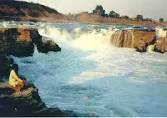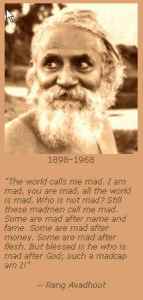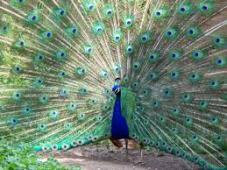Sri Rang Avadhoot Maharaj of Nareshwar,
Gujarat, India
Part – III (The Last part)

(The information of this post is based upon the biography “Nareshwarana Rang Avadhoot” written in Gujarati by Shri Dhirubhai Joshi. This book is published by “Shri Avadhoot Sahitya Prakashan Trust, Nareshwar,” August 22, 2011).
Shri Rang Avadhootji was always engaged in spiritual practices. Once he thought of reading “Datta Purana” 108 times and also to do japa. He then wanted to celebrate this completion of his reading. But, he did not have any money and he would never ask anyone for money. As a celebration he decided to complete Parikrama (meaning walking around the whole Narmada River) in 108 days.
Narmada Parikrama:
Though it is possible to walk around the Narmada River, it is a difficult task. Thousands of people do this “Parikrama.” The rule is to start at any place on the bank of the Narmada River, walk around the river and come back to the same place. Only at Vimaleshwar where Narmada River meets the ocean, one can take a boat and go to the other side of the river. Many people die doing this “Parikrama.”

My paternal grandfather had also tried this “Parikrama”, when I was very young. I remember that he prepared himself with all the things needed for this Parikrama and took only few things which he could carry himself. The day he left, we were proud of him, but were also sad and concerned about his health and his life. After he left, we used to recite “Narmadshtakam” every day in our family evening prayer to remember the Narmada River and to pray for him. He walked for more than a month (I don’t remember the exact timing), but his health could not let him finish it and he came back with a heavy heart.
Shri Rang Avadhoot Maharaj started his “Parikrama” from a place called Mortakka. On an average, he used to walk 25 miles per day, and sometimes he even walked 50 miles in a day. He walked every day except when he was sick or if a sincere devotee requested him to stay. In those cases, he would stay for a day or two. If people offered him food he would eat, otherwise he would melt jaggery (brown sugar) in water and drink it in place of a meal. He had amazing experiences of people’s kindliness and good heartedness. Many strangers gave him meals and even jaggery when he had used up all his supplies.
Someone asked Shri Avadhootji: “We are doing “Parikrama” to remove our worldly suffering. You do not have any worldly suffering, then why are you going through these difficulties?” Shri Rang Avadhootaji said, “I am in search of suffering, but I am not finding any. In all circumstances, I always feel joy within.” Shri Avadhootji often said that, if one had any doubt about the existence of God, one should go on a Parikrama of the Narmada River where he/she would have many experiences which would remove all doubts about God’s existence.

Shri Rang Avadhootji met a devotee who was singing bhajans with a “tamburo” (a string instrument which gives a scale for singing,) while doing Parikrama. One night, some robbers confronted them and demanded all the money and the precious things they have. Everyone gave what they had, but the devotee with the “tamburo” did not give his “tamburo.” He told the robbers that he needed the “tamburo” to sing bhajans. But, the robbers snatched his “tamburo” and smashed it on the ground. The hollow bottom of the “tamburo” broke and several coins fell out of it. Everyone realized why he did not want to give away his “tamburo,” besides wanting it for singing. Later when Shri Avadhootji found that the devotee was really missing his “tamburo” to sing bhajans, he requested some kind-hearted person to buy him another “tamburo.”
Shri Rang Avadhootji’s spiritual personality used to attract many people and they felt blessed to provide him food. Witnessing this, some people tried to accompany him in his walk. But, Shri Rang Avadhootji liked to walk alone, and think of God. Hence, he had to find ways to be alone.

On his way, notable people at a couple of places, asked him to be the head of their religious institutions, but he denied those requests. He said that he just wanted to be free from all bondages. At Vimaleshwar, Shri Rang Avadhootji and some other people were crossing the Narmada River by boat. All of a sudden, a big storm came and it started rocking the boat. People thought they were going to die soon. Some started crying and some were screaming. Shri Rang Avadhootji sat quietly. People asked him to pray to the Narmada River for his life. Shri Avadhootji said, “Look, if I die, I will be dying in the lap of Mother Narmada. If we survive, then we would have made it to the opposite bank of the river.” The storm subsided and everyone landed safely on the other side of the river. After that incident, Shri Rang Avadhootji wrote “Vande Narmadam.” Upon completion of the Parikrama, Shri Avadhootji came back to Nareshwar. He came to be known as “Nareshwar Nivasi Shri Rang Avadhoot Maharaj.”
Shri Rang Avadhoot Maharaj’s writings:
In a dream, Shri Rang Avadhootji received a command from his Guru Shri Vasudevananda Saraswati, to write about the life of Lord Dattatreya. Following the command of his Guru, he wrote a book about it.
He also wrote “Shri Guru Lilamruta.” When the first part was published, a critic for a leading Gujarati magazine “Buddhi Prakash”, wrote that “Shri Guru Lilamruta” was going to be well-received by many people.
Shri Avadhootji wrote many hymns and bhajans. A collection of his bhajans was published in the book “Avadhooti Ananda”. His book “Rang Hridayam, consists of some of his Sanskrit hymns and poems. One of his popular books “Datta Nama Smaran,” is a collection of 108 shlokas. He also wrote “Sangit Gita,” a book containing all the shlokas of the Bhagavad Gita written in Gujarati and in the same meters as the Sanskrit Shlokas. He wrote a book titled, “Atma Chintan”, exploring the teachings of Vedanta and a book called, “Shri Datta Panchapadi”, consisting of bhajans to be sung at night. Even now many people sing these bhajans at night. He wrote about the significance of the pilgrimage place Nareshwar in a book titled “Nareshwara Mahatmya.”
Shri Rang Avadhootji wrote the famous “Datta Bavani” while he was staying at Siddhanath Mahadev Temple in Saija Village near Kalol- Sheratha. This was written to remove fear of his devotee’s wife. Even today, “Datta Bavani” (a 52 line hymn) is being sung regularly in many houses, especially on Thursdays. As I mentioned it in a previous post, this hymn was sung in my family every Thursday during the evening prayers. My mother knew it by heart and often recited it.
Shri Rang Avadhootji’s letters were published in two volumes. These letters reveal his various thoughts and his state of mind in Nareshwar.

Shri Datta Jayanti Celebrations:
Shri Rang Avadhootji mostly observed silence. When one devotee used to bring or send food on Thursdays and Sundays through another devotee, Shri Avadhootji used to speak to them. Later on, people found out that Shri Avadhootji spoke on Thursdays and Sundays. Then, more people started coming on Thursdays and Sundays to salute Shri Avadhootji and to ask him their questions. Since Shri Avadhootji sang glories of Lord Datta, people decided to celebrate Shri Datta Jayanti in his presence. Every year for two days devotees celebrated Shri Datta Jayanti by reciting “Shri Guru Lilamruta,” singing bhajans and dhoons, and offering special worship to Lord Dattatrey. During the celebration, everything was well organized and people were self-disciplined which kept the dignity of the celebration and of the place. Within a few years, thousands of people started attending the Datta Jayanti celebration. Word spread that Shri Rang Avadhoot Maharaj had created an inspiring place of pilgrimage at Nareshwar. Great Gujarati poet and patriot Shri Jhaverchand Meghani wrote admiringly about the Datta Jayanti celebration at Nareshwar. Since the number of participants became very large, Shri Rang Avadhootji told them that they should celebrate Shri Datta Jayanti in their own villages and that he would visit the villages in rotation.
Love for his Mother & Rang Jayanti:
Shri Rang Avadhootji’s younger brother Narayana was taking care of their mother in Mumbai. But, Narayana became very sick. Shri Avadhootji brought his mother and Narayana to Nareshwar. Shri Rang Avadhoot Maharaj realized that Narayana was worrying about their mother’s well-being in the event that Narayana died. Shri Rang Avadhootji told Narayana that he should not be worrying about their mother. He assured Narayana that in order to take care of their mother if he had to work and earn money he would do it. With this assurance, Narayana peacefully passed away. Mother Rukmamba cried profusely at the demise of her son Narayana. Shri Rang Avadhootji took good care of their mother. Mother Rukmamba’s grief slowly subsided and she started getting acquainted to Nareshwar.
Every day Shri Rang Avadhootji made sure that his mother was doing well. Whenever he went out of town, he asked his mother’s permission. If he was away and found that his mother was not feeling well he would return to Nareshwar immediately. He chose to travel to places close to Nareshwar. People who came to pay respects to Shri Rang Avadhootji also paid respects to his mother Rukmamba. They found out from her the exact birthdate of Shri Rang Avadhoot Maharaj. Then, with the support of Rukmamba, people received permission form Shri Rang Avadhoot Maharaj to celebrate his birthday as “Rang Jayanti.” Thus, “Rang Jayanti Celebration” started.
Shri Rang Avadhootji’s 60th birthday was celebrated in Nareshwar in the presence of his mother. About 100,000 people gathered at Nareshwar to celebrate this special birthday. During Rang Jayanti Celebrations Shri Rang Avadhootji gave lectures at various places. All these lectures were compiled in a book called “Amar Adesh.” Mother Rukmamba lived happily at Nareshwar until her last breath.
Shri Rang Avadhootji in Africa:
A devotee had invited Shri Rang Avadhoot Maharaj to visit Africa. But, Shri Avadhootji wanted to be around his mother, so he could not accept that invitation. After his mother passed away, when the devotee requested his visit to Africa again, Shri Rang Avadhootji could not deny the invitation. In Africa, Shri Datta Jayanti was celebrated in his presence and Shri Avadhootji himself led a few bhajans and dhoons.
The Zambia Times reporter was very impressed by Shri Avadhootji’s presence. He felt as if a Messiah had come to visit Africa. An African lady who was planning to visit India met Shri Avadhootji and told him that she was scared to visit India. Shri Avadhootji gave her his picture and told her that she need not worry because God would be with her in India. The lady said that she had not seen God. Shri Avadhootji replied that he had seen God, so not to worry. This assured her and she overcame her fear. One British person saw St. Paul in Shri Avadhootji, another British man requested Shri Avadhootji to touch his handkerchief and bless it so that he could take it back home to his family members for them to touch the kerchief and be blessed. Shri Avadhootji kindly fulfilled that request.
Shri Rang Avadhootji enjoyed the Victoria Falls of Africa. The fall reminded him of the holy river Ganga emerging out of Lord Shiva’s head. He wrote a Sanskrit hymn describing this experience.
In Africa, Shri Avadhootji gave a lecture to a group of students. To motivate the students to achieve something in life, Shri Avadhootji told them that if a person in young age did not acquire knowledge, did not earn money as an adult, and did not do any good work, then what was the purpose of his/her life. He advised the students to put in a lot of effort in studying and build up a strong academic foundation. Shri Avadhootji then led one of his songs which said, “O Beloved God! Let a day come when I see you everywhere.” Students sang after him. Then, he asked everyone to meditate for a couple of minutes. It was a very inspiring occasion.
Shri Rang Avadhootji travelled in five states of Africa and then returned to India. He was pleased with this trip. The following link has a small video capturing few glimpses of his Africa trip. Click the link, then click “YouTube”, and then click on “Avadhoot Dekh Lo..”
http://www.rangavadhoot.org/page21/
Final Days:
In July and August 1968, Shri Rang Avadhoot Maharaj first stayed at Kujarav and later at Vallabh Vidyanagar. There he met Shri Ravishankar Maharj, Rev. Shri Mota, Bhaikaka, Shri H. M. Patel and others. In Vadodara he delivered a lecture in Sanskrit. After a few days, someone requested him for the script of his Sanskrit lecture. He had gotten rid of the script but at the person’s request, he wrote down the whole lecture word for word from his memory. People were amazed by his mental capacity. He visited several places in Gujarat, and at Kapadvanj he told his devotees that Kapadvanj was his last station. Indeed it was his last station in Gujarat.
Shri Rang Avadhootji then went to Jaipur where devotees celebrated Rang Jayanti in his presence. He blessed everyone and encouraged them to do Japa Yoga to experience divine bliss within and to be free from all bondages. From Jaipur, he went to Haradwar. Someone asked him when he would return from Haradwar. Shri Avadhootji replied that anyone who had gone to Haradwar never returned back. On November 19, 1968 he repeated Om three times and left his body in Haradwar. On his birthday, November 21, 1968, his body was cremated in Nareshwar.
A Few Teachings and Sayings of Shri Rang Avadhoot Maharaj:
– One of his advertisement-writing is amusing:
“Wanted, Wanted, Wanted”
Who?
Spiritual Teachers
What kind of Teachers?
Those who
– are not just orators, but practice what they teach
– do not teach by words, but set-up examples from their own life and inspire
– are not eager to advise others, but eager to teach themselves first before teaching
– are not eager to become Gurus, but ready to be disciples of all
– do not steal money of their students, but remove their sufferings
– are not just idealistic, but very pragmatic
– do not remain in dream-land, but are always conscious of everything
What is the salary?
Inner Satisfaction, Eternal Bliss, and Unbroken Inner peace
Where to Apply?
Within your hearts
When to Start Working?
At the very moment you make a firm decision
Where to Join?
Join at the place wherever you are.
How do you know your application was accepted?
When you feel joy within for working.
Whom to send your application?
To your own inner Self – which is Avadhoot.
By “The Friend of the World – Rang Avadhoot”
——————————————————–
Other Teachings:
– “Mata Mataiva Kevalam” – There is nothing like Mother
– “Paraspara Devo Bhava” – May you consider each other as divine.
– “Swayam Ashishah Tu Satkarma” – Good action is blessing itself.
– “Shreyah Prayaso Vishishyate” – Shreya (preferable) is better than Preya (pleasurable)
– “Bhaktir Danbhah Vina Bhavam” – Devotion without love is hypocrisy.
– “Jena Dilama Deenani Daj Nathi Eva Durijananu Ahi Kama Nathi” – We do not need such a bad person here who does not have love and compassion for poor people.
– One Formless is hidden in the infinitely many forms (that we see).
– The World and God do not care for a beggar.
– Share joys and sorrows of your fellow beings.
– Where there is Oneness, there one finds Prosperity, and Joy.
– Dharma (religion or righteousness) is the one which takes us from animal-life to compassion-filled human life.
– Do not criticize any person, society, institution, or a religion.
– Listen good things even though it is little, think more (on what you had heard), let it go through the testing of discrimination (Viveka), and then practice in life.
– Keep God with you in your every action.
– Past has gone from your hands, so do not brood over it. Future is not in your hands, so don’t dream about it. Take maximum advantage of the presence and filled your mind with joy.
– People want benefit without working – how can that happen?
– Unpracticed Knowledge is as useless as wealth buried in the ground.
– One who ignores the responsibilities given by God and simply repeats God’s name is an enemy of God.
– Dharma (Righteousness) should be the foundation of the temple of progress of society and Moksha (Freedom from all bondages) should be its roof.
– The foundation of Joy is the repetition of God’s name.
– “Hinena Duyate Iti Hindu” – One who feels pain within by any harmful action is a Hindu.
– Speak less and do more.
– Bring unity in your thoughts, speech, and actions.
– Keep your head cool, and keep your hands and feet warm (meaning be active in doing good work).
– If you want to improve my health, please keep me with youngsters.
—————————————————-
The following link has an MP3 audio of Shri Rang Avadhoot Maharaj’s speeches (in Gujarati) compiled as “Amara Adesh.” There are four parts. The last part includes bhajans.
http://www.rangavadhoot.org/page78/index.html
I have selected the following six small pieces from these audios to have a glimpse of Shri Rang Avadhoot Maharaj’s singing, and his powerful and inspiring speeches, his knowledge of scriptures, his choices of words and a natural flow of expression coming from within:
(1) Speech telling that “I am not a Dharma Pracharak”:
(2) Talk on Lord Dattatreya:
(3) Lecture on “God is One”:
(4) The Upanishad’s Story about “DA, DA, DA” (Daman, Dan, and Daya):
(5) Shri Avadhootji singing Lord Dattaterys Hymn (I have taken only couple of stanzas):
(6) Shri Avadhootji’s Reva Hymn sung by artists (I do not know their names):
(Thanks to Jyoti Champanerkar for editing this post.)





